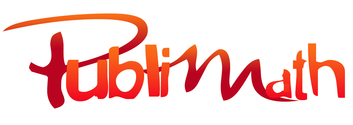History and Epistemology in Mathematics Education. Teaching-learning of mathematical concepts through podcasts: an attempt to link history of mathematics (HM) and digital information and communication technology (DTIC). p. 354-357.
(L'enseignement de concepts mathématiques à travers des podcasts : une tentative de relier l'histoire des mathématiques (HM) et les technologies numériques de l'information et de la communication (DTIC).)
Une version texte intégral est en téléchargement sur le site Bibliothèque numérique des IREM et de l’APMEP Télécharger
Auteurs : De Bortoli Adriana ; Garbelini Martos Rodrigues Zionice
Résumé
Cet article décrit la construction et l’utilisation d’une plateforme nommée Mathpods, destinée à des collégiens et développée au Brésil par 3 étudiants en Analyse et Développement de Systèmes, et Systèmes pour Internet dans le cadre d’un projet en premier cycle universitaire. Abstract In this short paper, we aimed to make considerations about the researches that were made in the Mathematic Education field, whose aim will be to achieve an articulation between two teaching trends: History of Mathematics (HM) and Digital Information
La présentation des concepts mathématiques a été guidée par des procédures historiques (comme la résolution des équations par la méthode de fausse position). Cette plateforme a été expérimentée dans la région de Sao Paulo. Il en ressort que les participants ont souligné le fait que ces podcasts contribuent à l’inclusion en matière d’éducation car il s’agit d’un média qui devient plus accessible au grand public et qui capte l’attention des jeunes.
and Communication Technology (DTIC), aiming to promote reflections regarding Mathematics teaching in order to enhance the learning process of the discipline. For that purpose, we will present a description of the construction of a platform named
Mathpods, whose virtual learning environment (VLE) consists of a platform developed by (three) 3 students from the course of Analysis and Development of Systems and Systems for the Internet in the form of a undergraduate research. The developer stu-
dents are from a public college in the state of São Paulo/Brazil. Such virtual learning environment enhances the teaching-learning process of mathematical concepts through podcasts. We will present the creation process and its uses and describe the potential of this technological educational product. Furthermore, the choice of ma- thematical concepts guided by historical procedures (such as the equations of second degree by the false position method) and considerations of extension actions in which we propose
courses for Basic Education students will be addressed. We concluded that the platform has been helping teachers and students in the teaching and learning process at a local level in the state of Sao Paulo/Brazil, as podcasts make the teaching methodology
more flexible and meet the interests of students. In addition, the extension actions by the authors have enabled the interaction between the college/institute and state public schools, which is believed to have added additional possibilities in times of remote education. Besides this, one of the authors seeks to investigate the contributions of the podcast elaboration with undergraduates in Mathematics from an institute of education, science and technology in the northwest of the state of São Pau- lo, in two curricular
components, namely the Laboratory of Mathematics Education and Non-Euclidean geometries. As preliminary results, we verified the students’ interest in knowing mathematical concepts produced by other peoples, in addition to the desire to learn about
new cultures, including the enhancement of a methodological procedure that consists of making available historically produced mathematical subjects forwarded through podcasts that were made available on the platform. Additionally, it was pointed out by the participants of the audio productions that Podcasts contribute to inclusion regarding education (mainly for needs related to low vision) and that it stimulates those who are producing in various areas sine qua non for teaching practice, in addition to if it consists of a medium that becomes more accessible to the general public, as currently the appropriation of virtual resources successfully captures the attention of young people.
Notes
Chapitre des Actes de la neuvième université d’été (ESU 9)
Données de publication
Éditeur Edizioni Nuova Cultura Rome , 2023 Format p. 354-357 Index Bibliogr. p. 357-357
ISBN 88-3365-601-2 EAN 9788833656014
Public visé chercheur, enseignant, formateur Âge 14
Type chapitre d’un ouvrage Langue anglais Support papier
Classification
